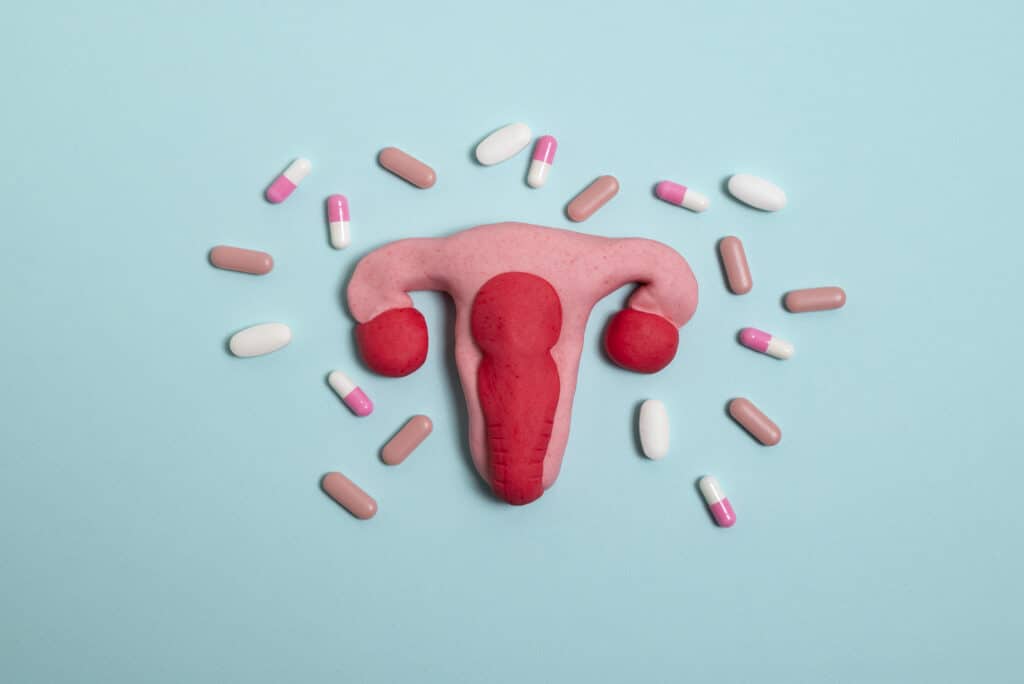The last decade has been marked by a widespread discussion of women’s health, which was previously taboo. The dietary supplements market is seizing this opportunity and adapting to accompany them in the key periods of their lives:
- menstrual cycle, premenstrual syndrome and endometriosis
- contraception, infertility and maternity of women
- menopause and incontinence.

Food supplements for women’s health are an exploding market.
A look at a flourishing market
In France, sales of “women’s health” products in pharmacies will reach almost 50 million euros in revenues in 2021(1). This represents a growth of more than 9% compared to the year 2020 and more than 21% compared to 2019!
This is not surprising when 20 to 40% of women of childbearing age suffer from premenstrual syndrome (PMS), and endometriosis affects 10% of them (2) (3).
And increasingly segmented
The market is specializing in order to respond to more and more specific problems with the following key ingredients:
- Plants : evening primrose oil for its virtues on the skin or Rosa centifolia for PMS symptoms ;
- Vitamins : especially B6, with the possibility of alleging the regulation of hormonal activity ;
- And minerals : more particularly zinc (fights against oxidative stress) and iron which contributes to fight against the depression related to PMS.
Women’s health begins with menstruation.
“50 to 70% of teenage girls experience painful periods permanently or occasionally” (4). Supplements support the menstrual period of many women throughout their lives and as early as puberty.
Ameli, 2022. Symptoms and diagnosis of menopause
PMS results in physical and psychological symptoms (fatigue, nervousness, pain, digestive problems) and starts before the period. It is a real obstacle in the daily life of 20 to 40% of women (2).
As for endometriosis, it affects 1 in 10 women of childbearing age (3).
Faced with these various disorders, food supplements can be a real asset. The formulas are composed of: vegetable oils rich in omega 6 such as borage, biotics and plants (chamomile, saffron, holly …). This market is no exception to the keys to success of innovation. The use of patented ingredients to support the effectiveness of supplements, such as maritime pine extract, is de rigueur. However, dietary supplements for women’s health must not forget the emotional environment that is very present in this segment. Storytelling is essential and the key to success!
Combinations of ingredients can also provide additional solutions. Example with the combo: quercetin, curcumin, chamomile, vitamin B3, B9 and omega 3 and 6 to reduce inflammation (4) (5).
See : Innovative food supplements: the keys to success.
From contraception to motherhood: women’s health in turmoil
contraception
More and more women are considering stopping the pill but fear a hormonal upheaval. Some brands even offer post-pill “detox” solutions. The objective is to act on hormonal balance, in particular the beauty of the skin with the apprehensions related to acne and PMS.
procreation
Polycystic Ovarian Syndrome (PCOS), which is caused by hormonal imbalance, is the leading cause of female infertility (6). “Chasteberry” is used to restore the balance by increasing hormone levels. Also, some minerals are included in formulations for depressive syndromes and anxiety.
Food supplements for women’s health are real allies to accompany the different stages of pregnancy : pre, peri and post pregnancy. The emphasis is on iron, folates or vitamin B9 and even iodine and vitamin D.
Pre- and post-pregnancy supplementation is not left out. It is a matter of boosting fertility and maintaining the body’s resources for the good progress before and after.
Dietary supplements for women’s health, more than any other segment, are conducive to creating a real “community”, where experience sharing and education are paramount.
Menopause and associated symptoms: a key topic in women’s health.
Menopause is often accompanied by climacteric disorders “symptoms that accompany the hormonal changes associated with the cessation of ovarian function” (4). They are diverse and include for example: hot flashes, insomnia and fatigue…
In fact, 82% of menopausal women are subject to one of these symptoms which can last more than 10 years.
The classic ingredients are present: chasteberry, hawthorn … and also leave room for “new” ingredients from Ayurvedic plants (Ashwaghanda, Guduchi and Guggul).
Even bean sprouts and isoflavones (PE) seem to be making a comeback although they have long been reviled.
Conclusion
The market of food supplements for women’s health is more and more segmented and is of interest to both the leading laboratories in the market and the DNVBs (Digital Native Vertical Brand). Some brands are also focusing entirely on the women’s health market.
Accompaniment and pedagogy are key in addressing these pathologies. Finally, the association between emotion and efficiency is key!
1. Synadiet, 2022. The dietary supplements market in 2021.
2. INSERM, 2021. #PayYourCycle: What is premenstrual syndrome?
3. INSERM, 2018. Endometriosis: a common but still poorly understood gynecological disease.
4. Ameli, 2022. Symptom and diagnosis of menopause
5. National Library of Medicine, 2018. Novel dietary supplement association reduces symptoms in endometriosis patients.
6.INSERM, 2022. Polycystic Ovarian Syndrome (PCOS).